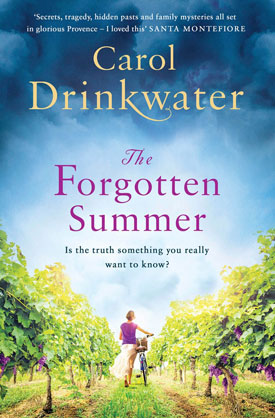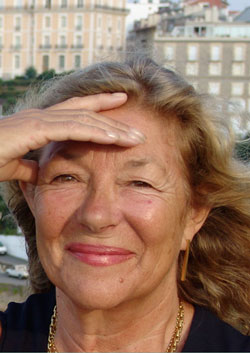Carol Drinkwater is best known for her nonfiction best seller Olive Farm series, with over a million copies sold worldwide. Her latest foray into set-in-France fiction, The Forgotten Summer, follows hot on the heels of three successful Kindle Singles.
As well as being a full-time writer, the 67-year-old’s busy schedule revolves around running her own olive farm on the Bay of Cannes, repairing an old château in La Brie and campaigning for bee awareness.
BH: Before establishing yourself as an author, you played the character Helen Herriot in the hit BBC television series All Creatures Great and Small in the 70s and 80s. How did this shape your life?
CD: The series brought me an award and a career with international recognition. It has proved itself to be classic TV and I am exceedingly proud of my role in it. However, I have moved on and done a million different things since – most are connected to writing and my life in France.
BH: The Forgotten Summer came out in February 2016. How much of the book draws on your own life story and experiences?
 CD: Well, there’s the deliciously warm South of France location, of course, although I don’t live on a fabulous vineyard overlooking the Mediterranean nor are we producing fine wines. Certainly, the chapter or two that is set in olive fields has been culled from my knowledge of producing olive oil. But perhaps, most importantly, the love story that sits at the heart of the book has been inspired by my love of my husband, Michel.
CD: Well, there’s the deliciously warm South of France location, of course, although I don’t live on a fabulous vineyard overlooking the Mediterranean nor are we producing fine wines. Certainly, the chapter or two that is set in olive fields has been culled from my knowledge of producing olive oil. But perhaps, most importantly, the love story that sits at the heart of the book has been inspired by my love of my husband, Michel.When I set out to write the novel, I looked to create characters that endured. An adolescent French boy, born in Algeria, meets a shy, young English girl having arrived with her English father who is hoping to represent an estate’s wines within the English market ... two children whose friendship blossoms, matures and becomes a love story. What happens when tragedy strikes? This is the kind of question my writer’s mind poses, and from there the seed of a novel is born.
BH: Do you think you would have been as successful a writer if, say, you’d lived in Bromley all these years?
CD: I would have been writing very different material if I had lived in Bromley or any suburban environment. However, I have been writing since I was about eight years old, so the process was well underway. France and the Côte d’Azur, with its natural beauty – light, colour, vegetation – has inspired me as it did many of the master painters. How could it not?
I live in one of the most beautiful places in the inhabited world. My eyes, all my senses, experience this every day that I am at home at our olive farm. But, and this is big but, if I really have my eyes open, there are other elements, other notes, tones, in the Provençal palette, that I cannot turn away from. There is racism, there is alienation; there are tricky local power politics. All these can add to the drama, if I so choose. France is not perfect. I believe it is one of the finest places on earth to live but it is important that a writer does not look through rose-coloured spectacles. And that is what inspires me: the contradictions, the secrets, the hidden layers ... all played out against a backdrop of beauty and good living.
BH: Would you say your non-fiction work has helped you to develop as a writer?
CD: Everything has helped be to become a better writer. Acting, life, pain, loss, grief, love, happiness, passion, great sex, travelling the world ... Writing is writing, whether fiction or nonfiction.
BH: Tell me about bee awareness.
 Carol DrinkwaterCD: Arriving home after sixteen months travelling around the Med in quest of the history of the olive tree, I discovered that the 14 honeybee colonies that had been residents on our olive farm for over a decade had died off or disappeared. I telephoned the beekeeper, who had always tended the hives during our absences, and learned that he had was on the point of bankruptcy. Out of his entire stock of 103 colonies, only a handful had survived.
Carol DrinkwaterCD: Arriving home after sixteen months travelling around the Med in quest of the history of the olive tree, I discovered that the 14 honeybee colonies that had been residents on our olive farm for over a decade had died off or disappeared. I telephoned the beekeeper, who had always tended the hives during our absences, and learned that he had was on the point of bankruptcy. Out of his entire stock of 103 colonies, only a handful had survived.I began to look into the problem in more depth. I learned that pollinators, particularly honeybees, are under serious threat. A third of the western world’s honeybees have disappeared. Pesticides, habitat loss, parasites, intensive farming, all have been cited as causes and I believe there is an urgent need for awareness about land management. I also believe that no matter where we live, no matter how small our patch – even window-boxes – we have the possibility to help avert the deepening of this crisis.
I created a page on my website because I want to keep abreast with and share what is happening in the world of apiary. I am keen to hear from experts or novices.
BH: What are your plans for the future?
CD: I am in the middle of a new novel also set in France and the UK and am getting very excited about it.
BH: The Daily Mail says The Forgotten Summer has “plenty of page-turning drama ... but also mouth-watering descriptions of Paris and Provence.”
CD: They also said “makes you want to rush to buy a ticket on the Eurostar” … this is a review that every author dreams of, especially with the Mail’s huge readership, it is a gift. On Amazon or reading bloggers on Twitter, the reviews have simply been fantastic. I am over the moon – and very relieved.
The Forgotten Summer is available at Antibes Books and the English Book Centre in Valbonne. See also www.caroldrinkwater.com






